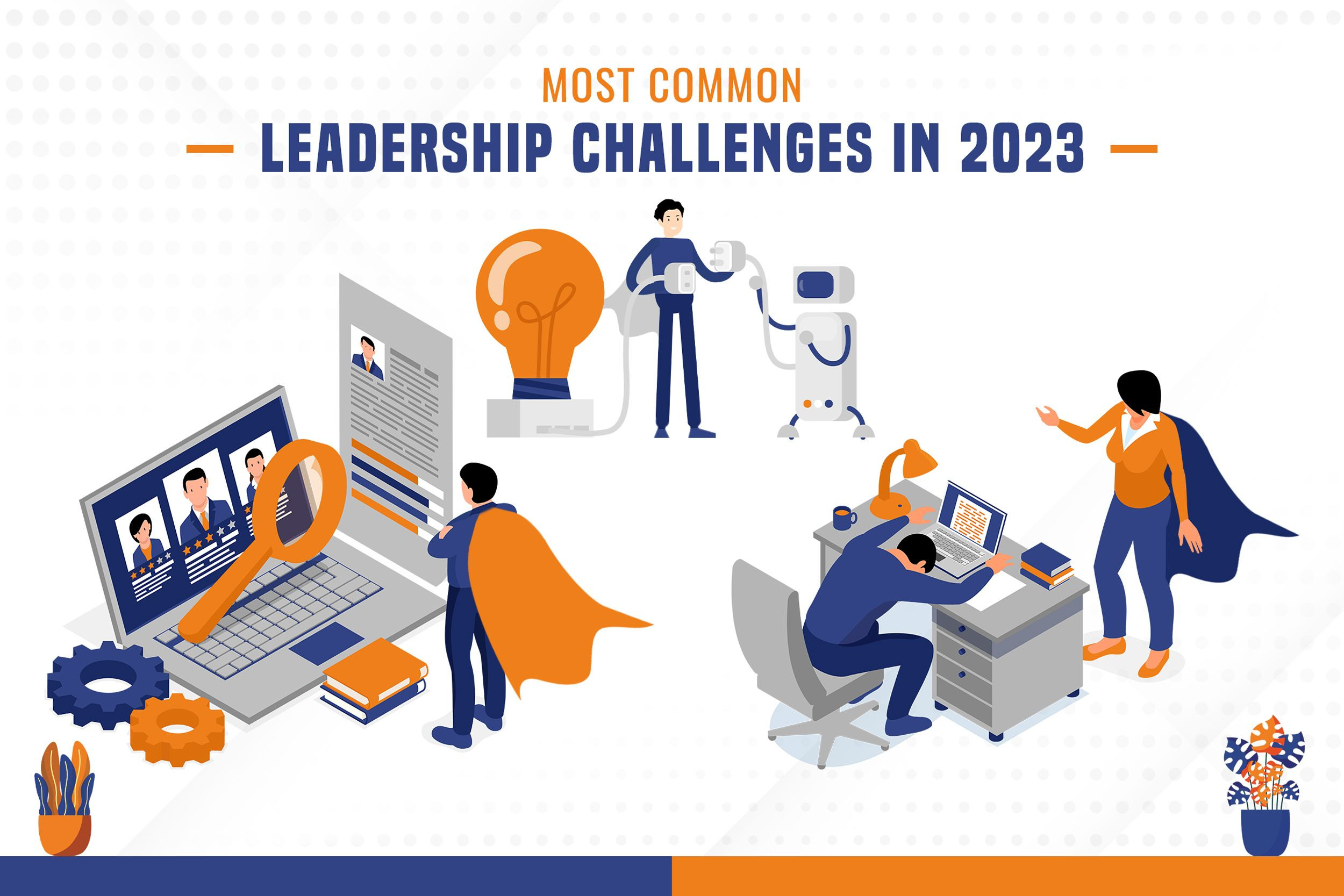
Most Common Leadership Challenges in 2023
In the dynamic landscape of 2023, the role of leaders has become more crucial than ever before. As organizations adapt to rapid technological advancements, shifting demographics, and unprecedented global events, leaders must confront a host of new challenges. From fostering remote collaboration to maintaining employee well-being, the leadership landscape has evolved significantly. In this article, we delve into the most common leadership challenges that define 2023 and explore strategies to tackle them head-on.
Common Leadership Challenges in 2023 and Handling Them
1. Embracing Technological Disruption
In the present age defined by AI, automation, and digital transformation, leaders are tasked with adeptly managing the complexities inherent in adopting new technologies. They must skillfully balance the challenges and prospects that arise from this technological disruption. Equally important is the need to equip their workforce with essential digital skills, empowering them to thrive in this rapidly evolving landscape. Guiding the integration of AI-driven processes also stands as a pivotal responsibility, enabling leaders to harness the potential of technology while steering their teams toward innovation and sustainable growth in this dynamic tech-driven environment.
2. Remote Collaboration and Team Dynamics
As remote work gains prominence due to global events, leaders grapple with a distinct array of leadership challenges. Sustaining team unity, nurturing impactful communication and Leadership and Management Training Courses, and instilling a shared identity within virtual teams emerge as indispensable elements in preserving productivity and mitigating employee isolation. The task at hand necessitates adept leadership that transcends physical boundaries, fostering an environment where remote collaboration flourishes. By prioritizing team cohesion, facilitating seamless communication, and engendering a sense of inclusivity among virtual teams, leaders pave the way for sustained engagement and collective accomplishment, even in the era of dispersed workforces.
3. Nurturing Diversity and Inclusion
As the significance of diversity and inclusion grows, leaders shoulder the responsibility of crafting workplaces with relevant Leadership Training and Development that embrace equity and celebrate individual distinctions. Beyond recruiting a varied workforce, this mandates the establishment of comprehensive policies and proactive initiatives that cultivate a pervasive sense of belonging among all employees, irrespective of their origins. Effective leadership in this context necessitates the commitment to dismantle barriers, amplify unheard voices, and cultivate an environment where differences are not only acknowledged but also woven into the organizational fabric, fostering innovation, collaboration, and a harmonious synergy that propels the entire team toward success.
4. Employee Well-being in a Hybrid World
With the ascent of hybrid work models as the new standard, the well-being of employees takes center stage in leadership priorities. Skillfully managing the interplay between work and personal life, staving off burnout, and delivering robust mental health assistance stand as vital components of adept leadership in the contemporary work arena. Navigating this landscape requires leaders to cultivate a culture where well-being is taken care of in the organization, fostering an environment that nurtures both professional growth and personal flourishing. By prioritizing employee welfare through Leadership Skills Development Training, leaders fortify a workforce that is resilient, engaged, and poised for sustained achievement.
5. Adapting to Geopolitical Uncertainties
In a world marked by geopolitical fluctuations, businesses encounter consequential impacts. Leaders shoulder the critical responsibility of not only comprehending but adeptly maneuvering through regulatory shifts, trade interruptions, and geopolitical tensions. This adept navigation is pivotal for steering their organizations toward not just survivability, but growth and stability. Effective leadership necessitates a blend of strategic foresight, resilience, and nimbleness in the face of uncertainty. By embracing these challenges as opportunities for innovation and adaptation, leaders can fortify their organizations to thrive amidst geopolitical complexities, fostering sustained success even in the midst of an ever-changing global landscape.
6. Sustainable Leadership and Corporate Social Responsibility
As the year unfolds, 2023 elevates the significance of sustainability and corporate social responsibility. Leaders are entrusted with the pivotal role of advocating for eco-conscious practices, principled decision-making, and active community involvement. By aligning their organizations with the overarching objective of generating positive societal contributions, leaders wield their influence to foster meaningful change. The modern leadership landscape demands a fusion of business acumen and ethical stewardship, driving synergy between profit and purpose. By championing sustainability and embodying corporate social responsibility, leaders pave a transformative path through Leadership Training and Development, where organizations not only flourish economically but also contribute to the betterment of the environment and society at large.
7. Agile Leadership and Change Management
In a perpetually evolving business landscape, change has entrenched itself as a constant. This demands leaders to wield agile strategies for orchestrating seamless transitions. The capacity to navigate shifts in market dynamics, organizational reconfigurations, and fluctuations in consumer preferences underscores the indispensability of agile leadership. Effective change management rests upon the shoulders of leaders who possess both resilience and adaptability. Guiding teams through a transformation with a steadfast yet flexible hand, these leaders infuse stability into turbulent waters. By embracing change as an opportunity rather than a disruption, agile leaders steer their organizations toward enduring success, while fortifying a culture that thrives amidst ambiguity and innovation.
Final Words
In the ever-evolving landscape of 2023, effective leadership demands a multifaceted approach. Leaders must embrace technological advancements, foster remote collaboration, prioritize diversity and inclusion, safeguard employee well-being, navigate geopolitical uncertainties, uphold sustainable practices, and exhibit agile change management. By acknowledging and proactively addressing these challenges, leaders can steer their organizations toward success and resilience in a world that continues to present both opportunities and obstacles. As we look to the future, the ability to adapt, innovate, and inspire will remain the hallmark of exceptional leadership.
